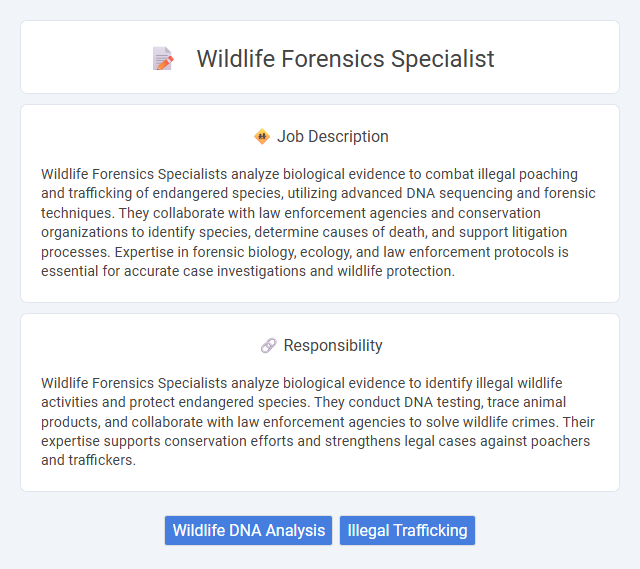
Wildlife Forensics Specialists analyze biological evidence to combat illegal poaching and trafficking of endangered species, utilizing advanced DNA sequencing and forensic techniques. They collaborate with law enforcement agencies and conservation organizations to identify species, determine causes of death, and support litigation processes. Expertise in forensic biology, ecology, and law enforcement protocols is essential for accurate case investigations and wildlife protection.
People with strong analytical skills and a passion for conservation will likely find wildlife forensics specialist roles suitable. Those comfortable working with biological samples and crime scene investigations may have a higher probability of success. Individuals who prefer outdoor work combined with laboratory analysis could be well-matched to this career.
Qualification
Wildlife Forensics Specialists require a strong background in biology, ecology, or environmental science, typically holding a bachelor's or master's degree in these fields. Proficiency in molecular biology techniques, DNA analysis, and knowledge of wildlife laws and regulations are essential for accurate evidence examination and legal support. Experience with crime scene investigation, lab procedures, and databases such as CITES enhances the ability to combat wildlife trafficking and poaching effectively.
Responsibility
Wildlife Forensics Specialists analyze biological evidence to identify illegal wildlife activities and protect endangered species. They conduct DNA testing, trace animal products, and collaborate with law enforcement agencies to solve wildlife crimes. Their expertise supports conservation efforts and strengthens legal cases against poachers and traffickers.
Benefit
Wildlife forensics specialists likely enhance conservation efforts by accurately identifying illegal poaching and trafficking activities, which can lead to stronger law enforcement actions. Their expertise probably supports the protection of endangered species, promoting biodiversity and ecosystem health. The role may offer unique opportunities for collaboration with law enforcement and environmental agencies, providing a fulfilling career that combines science and conservation impact.
Challenge
Wildlife Forensics Specialists likely face the challenge of accurately identifying species from often degraded or incomplete biological samples, requiring highly specialized knowledge and analytical skills. The complexity of distinguishing between legally protected animals and their illegal counterparts may present a constant hurdle, making the investigation process demanding and meticulous. It is probable that staying updated with evolving laws and advanced forensic technologies is essential to effectively support conservation efforts and wildlife crime investigations.
Career Advancement
Wildlife Forensics Specialists play a critical role in analyzing evidence related to poaching, illegal wildlife trade, and habitat destruction, using scientific techniques such as DNA analysis and environmental forensics. Career advancement in this field typically involves progressing from entry-level lab technician roles to senior forensic analyst positions, with opportunities to lead investigations and contribute to policy-making. Gaining specialized certifications, advanced degrees in forensic science or biology, and experience with cutting-edge forensic technologies can significantly enhance promotion prospects within government agencies, environmental organizations, and law enforcement.
Key Terms
Wildlife DNA Analysis
Wildlife Forensics Specialists utilize advanced Wildlife DNA Analysis techniques to identify species, track illegal poaching, and combat wildlife trafficking. These experts apply genetic markers and mitochondrial DNA sequencing to analyze biological samples, ensuring precise species identification and evidence collection. Their work supports conservation efforts by providing crucial data for law enforcement and wildlife protection agencies.
Illegal Trafficking
Wildlife forensics specialists analyze biological evidence to combat illegal trafficking of endangered species and wildlife products. They apply genetic testing, chemical analysis, and advanced forensic techniques to identify poached animals and trace illegal trade routes. Their work supports law enforcement agencies in prosecuting traffickers and protecting biodiversity worldwide.
 kuljobs.com
kuljobs.com